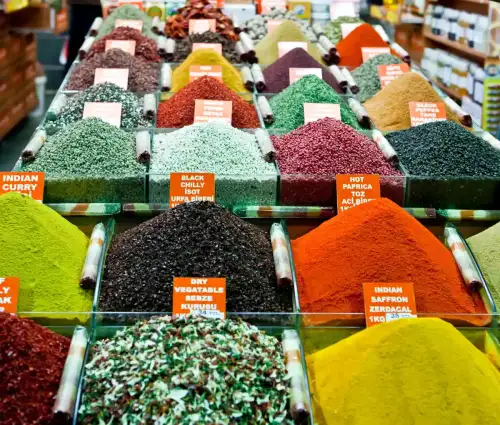Celiac.com 02/13/2025 - For those with celiac disease or gluten sensitivity, vigilance is key to avoiding gluten and staying healthy. While many people focus on avoiding obvious gluten sources like bread, pasta, or baked goods, hidden gluten in less conspicuous places, such as spices, can be a concern. This article delves into the risks of gluten contamination in spices, highlights safe gluten-free spice brands, and explores emerging research on potential cross-reactivity.
Understanding Gluten Contamination in Spices
Spices themselves, derived from plants, are naturally gluten-free. However, the manufacturing and packaging processes can introduce gluten contamination. For example, wheat flour or starch may be added as an anti-caking agent to keep spices flowing freely. Additionally, spices can be processed on shared equipment with gluten-containing products, leading to cross-contamination.
Celiac.com Sponsor (A12):
This contamination is especially problematic for people with celiac disease, where even trace amounts of gluten can trigger an immune response that damages the small intestine. Symptoms may range from gastrointestinal distress to long-term complications such as nutrient deficiencies and autoimmune conditions. Similarly, those with non-celiac gluten sensitivity can experience discomfort and inflammation from exposure to small amounts of gluten.
How to Spot Gluten-Contaminated Spices
To ensure the spices in your pantry are truly gluten-free, consider the following:
- Read Labels Carefully: Look for "wheat," "barley," "rye," or "malt" on the ingredient list. Terms like "modified food starch" can also be a red flag unless specified as derived from a gluten-free source.
- Look for Certification: Brands that carry a "Certified Gluten-Free" label have undergone rigorous testing to ensure their products meet strict gluten-free standards, typically less than 20 parts per million (ppm) of gluten.
- Avoid Bulk Bins: Spices sold in bulk bins may have been exposed to gluten-containing products through shared scoops or bins.
- Choose Single-Ingredient Spices: Blended spices, such as taco seasoning or curry powder, are more likely to include fillers or anti-caking agents that may contain gluten.
Safe Gluten-Free Spice Brands
Thankfully, many spice companies have recognized the importance of offering gluten-free options. Here are some trusted brands:
- McCormick: One of the most widely available brands, McCormick clearly labels its spices as gluten-free and maintains strict manufacturing processes to prevent cross-contamination. Their single-ingredient spices are a reliable choice.
- Simply Organic: This brand offers certified gluten-free spices, ensuring safety for those with gluten sensitivities. Additionally, their products are organic and sustainably sourced.
- Spicely Organics: All Spicely Organics spices are certified gluten-free, making them a fantastic choice for the celiac community. They also avoid using fillers or artificial ingredients.
- Badia Spices: Known for affordability and availability, many Badia products are labeled gluten-free. However, it’s still wise to double-check each product.
- Penzeys Spices: While not all Penzeys products are gluten-free, the company provides clear labeling and offers a range of gluten-free options.
Potential Cross-Reactivity in Spices
A controversial topic in celiac research is the concept of cross-reactivity. Cross-reactivity occurs when the immune system confuses proteins in gluten-free foods with gluten, triggering an immune response. Some preliminary studies suggest that certain spices might act as cross-reactors in sensitive individuals, though this remains an area of active research.
Spices Mentioned in Cross-Reactivity Studies
- Mustard: Mustard seeds and mustard powder have been implicated in some anecdotal reports of cross-reactivity. However, scientific evidence remains limited.
- Coriander: Another spice occasionally mentioned in cross-reactivity discussions, though findings are inconclusive.
- Paprika: Some studies have explored paprika as a potential irritant, but more research is needed to determine whether it plays a role in cross-reactivity.
It’s important to emphasize that these findings are not definitive, and most individuals with celiac disease tolerate these spices without issue. If you suspect a reaction, consider consulting with a dietitian or allergist to explore potential triggers and determine whether eliminating specific spices might help.
Practical Tips for Safeguarding Your Diet
- Stick to Certified Products: Whenever possible, choose spices with gluten-free certification to minimize risk.
- Store Spices Safely: Keep gluten-free spices separate from gluten-containing products in your kitchen to prevent cross-contamination.
- Be Cautious with Blends: If you’re unsure about a spice blend, opt for making your own at home using individual, gluten-free spices.
- Monitor Reactions: If you experience symptoms after eating a meal prepared with certain spices, consider eliminating them temporarily and reintroducing them one at a time to identify potential culprits.
What This Means for People with Celiac Disease or Gluten Sensitivity
For individuals with celiac disease or gluten sensitivity, understanding the potential risks of gluten contamination in spices is crucial. While spices can be a flavorful addition to your diet, vigilance is necessary to avoid accidental gluten exposure. By choosing certified gluten-free products and being mindful of cross-contamination, you can confidently enjoy the rich variety spices bring to your meals.
As research continues to explore the potential for cross-reactivity, it’s essential to rely on evidence-based findings rather than anecdotal claims. In the meantime, staying informed and proactive will help you navigate your gluten-free journey with confidence.
Incorporating spices into your gluten-free lifestyle doesn’t have to be complicated. With a little extra care and the right products, you can savor the world of flavors without compromising your health.











Recommended Comments
Create an account or sign in to comment
You need to be a member in order to leave a comment
Create an account
Sign up for a new account in our community. It's easy!
Register a new accountSign in
Already have an account? Sign in here.
Sign In Now